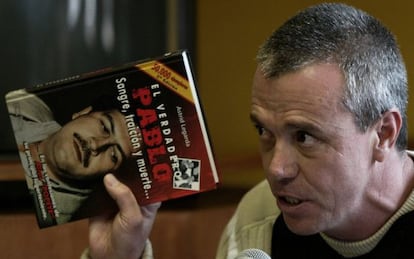Top hitman for drug lord Pablo Escobar released after 23 years in prison
“Popeye,” who killed over 300 for the Medellín cartel, is freed after serving three-fifths of his sentence

Jhon Jairo “Popeye” Velásquez Vásquez, Pablo Escobar’s chief assassin, has been released from prison after serving 23 years. Four days prior to his release, a Colombian judge expedited the proceedings for his probation status. At 9pm on Tuesday night, the 52-year-old convict stepped out into the streets in the company of Public Defender officials, shielded by a motorcade of armor-plated vehicles. Popeye had sent a handwritten request to officials that morning to ask for protection.
The former convict has admitted to killing more than 300 people and ordering the death of over 3,000 others during a period of heavy cartel violence from the late 1980s to the early 1990s. Yet the former assassin – who entered the criminal underworld at the height of the cartel’s reign, when he was just 18 – is afraid of freedom. He knows there is a price on his head and that he has made a lot of enemies given the crimes he committed, and the fact that he was a key witness in several trials – including the one related to liberal presidential candidate Luis Carlos Galán Sarmiento’s murder in 1989. Alberto Santofimio Botero, a fellow politician, was convicted for his part in the murder.
Popeye’s release was scheduled for Monday, but was delayed until Tuesday night so that officials could make sure he did not have any pending charges. Meanwhile, victims were trying to understand how a drug trafficker who terrorized the nation two decades ago could be leaving prison after serving just three-fifths of his sentence.
He studied 14 diplomas while in prison and earned a degree in environmental sciences
The operation for Popeye’s release became the mystery of the day. As time passed, photojournalists crowded in front of the gates of the maximum security prison with their cameras ready to capture his departure. The facility is in Cómbita, two hours outside of Bogotá.
The police had to coordinate a deployment of security forces to escort the freed man. The first group traveled with him to the Albarracín toll booth on the highway toward Bogotá. Another group picked him up and accompanied him to the capital. His final destination was unknown. Local media outlets say Popeye will join a rehabilitation group to help with his reintegration into society.
While in prison, Popeye studied for 14 diplomas and earned a degree in environmental sciences. The coldness with which he described his crimes has always surprised listeners. “If Pablo Escobar were born again, I would go with him without giving it a thought,” he said in an interview. Yet he has also said that he was a “retired criminal” who was in his “winter quarters.” In February 2013, he told El Tiempo newspaper that, once free, he would like to have a chance to redeem himself for the crimes he had committed. “I am a man who is looking for an opportunity in society. A man who is at peace with himself. When I leave, I repeat, I have no intention of hurting anyone. I am not afraid of justice because I’ve realized that even for a man like Popeye there can be justice.”
Popeye turned himself in to the authorities in 1999 alongside Pablo Escobar. He stayed by his capo’s side in the prison that Escobar himself built and from which he escaped one year later. The former hitman will be on probation for four years. He will be required to hold periodic meetings with authorities and keep his commitment to not break the law again.
His release has opened old wounds from the war on drugs – wounds that have yet to heal.
Translation: Dyane Jean François
Tu suscripción se está usando en otro dispositivo
¿Quieres añadir otro usuario a tu suscripción?
Si continúas leyendo en este dispositivo, no se podrá leer en el otro.
FlechaTu suscripción se está usando en otro dispositivo y solo puedes acceder a EL PAÍS desde un dispositivo a la vez.
Si quieres compartir tu cuenta, cambia tu suscripción a la modalidad Premium, así podrás añadir otro usuario. Cada uno accederá con su propia cuenta de email, lo que os permitirá personalizar vuestra experiencia en EL PAÍS.
¿Tienes una suscripción de empresa? Accede aquí para contratar más cuentas.
En el caso de no saber quién está usando tu cuenta, te recomendamos cambiar tu contraseña aquí.
Si decides continuar compartiendo tu cuenta, este mensaje se mostrará en tu dispositivo y en el de la otra persona que está usando tu cuenta de forma indefinida, afectando a tu experiencia de lectura. Puedes consultar aquí los términos y condiciones de la suscripción digital.








































